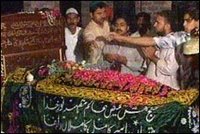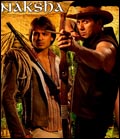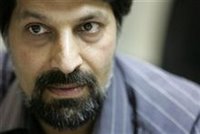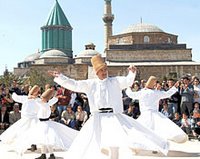
By Naseer A. Ganai - Greater Kashmir - Srinagar, India
Friday, August 25, 2006
The five-day workshop on “Peace and Conflict Resolution” organised by the Centre for Study of Society and Secularism, Mumbai in collaboration with an NGO, “Eves Welfare Association” concluded here Friday with most of the local speakers terming Kashmiriyat and Sufism “as propagated by India and Indian intellectuals as colonial discourses aimed at dubbing purely political movement of Kashmiris as religious one.”
The local speakers objected to the manner in which topics were selected by the organizers and stated that they consider juxtaposition of topics like history of emergence of Kashmir problem with Sufism and syncretic culture in Kashmir valley, freedom struggle, communalism problem and genesis of Pakistan, and Indian society-composite culture as “part of colonial discourse.”
The strong reaction from participants, mostly students, forced noted intellectual from Mumbai Asgar Ali Engineer to say, “Let us agree to disagree.”
Engineer, who spoke on various topics including ‘Indian Nationhood and Kashmir,’ ‘Islam Jihad and Terrorism,’ and ‘Indian society-composite culture and syncretic tradition,’ had to face most of the questions by participants.
Even some speakers described his discourse on creation of Pakistan as a view of Indian intellectual, forcing him to say, “I am not an Indian intellectual. I have my own views and it has nothing to do with what government of India says.”
On third day of the workshop on Wednesday, Asgar Ali Engineer spoke about Pakistan, and said creation of Pakistan “has done unimaginable damage to Muslims of subcontinent.” He said Muhammad Ali Jinnah “was not a leader of masses but leader of Muslim elite, and it was Muslim elite who created Pakistan.”
He said when Pakistan was created, the elite there never looked back to see what happened to Muslims in India. He said Pakistan was created for Muslims but the question is why it was created and had it fulfilled its goals? He then mentioned about status of Muhajirs in Pakistan, sectarian riots and creation of Bangladesh. He said more Muslims were killed during Bangladesh war than in riots in India.
However, audience insisted on India’s stand on Kashmir and charged India of denying Kashmiris their rights. The discussions went on for quiet some time with Asgar Ali Engineer saying, “Yes I consider Kashmir as an occupation and want that it should be given freedom or autonomy.”
On Tuesday, columnist Z G Muhammad urged Indian intellectuals that they should desist from talking about ‘madrassa culture’ of Jammu and Kashmir, and should not try to equate it with ‘madrassa culture in India and Pakistan.’ He said Kashmir does not have any ‘madrassa culture.’ “It might be in Lucknow, in Delhi or in Pakistan but not in Kashmir, and when I am not part of it why should you talk to me on this issue,” he said. He said some myths about Kashmir are being projected as history by Delhi-based intellectuals, and projection of Kashmiriyat, Madrassa or Sufi Islam are some of these myths masqueraded as history.
“Islam is Islam and there is no such thing as Kashmiri Islam which you call Kashmiriyat,” Zahid said. He said even if for the sake of argument “your theory about Kashmiriyat is taken seriously, then you have to acknowledge it’s Islam, which brought Kashmiriyat in Jammu and Kashmir.” He said Kashmiri Muslims had never any grouse against their Pandit brethren. “And still Kashmiriyat and Sufi Islam like terms are being thrust upon us, that too by those, who have history of communal violence,” he said.
The Wednesday afternoon session witnessed heated arguments with speaker Syed Fazlullah saying that Sufism does not mean silence and abdication. He said great Sufi saints here always preached how to safeguard their rights and how to fight for them. His speech and later comments by participants who termed the terms like Sufi Islam and Kashmiriyat “part of colonial discourse propagated by India in Jammu and Kashmir.”
However, Asgar Ali Engineer strongly reacted to it, and described the comments as “un-parliamentary.” Kashmiris, he said, have Sufi syncretic culture, and it was because of this the topic was selected.
Hameeda Nayeem, who teaches English Literature in Kashmir University, in her address on Friday talked about peace and conflict, and said right to self-determination would bring peace in Jammu and Kashmir and not discourse on Sufism and Kashmiriyat. She described Kashmiriyat and Sufism as “colonial discourse,” and said India was propagating Kashmiriyat to dub purely political movement of Kashmiris as religious one.
Hameeda said Kashmiriyat was being propagated to give communal colour to the political movement. “So much paper has been wasted on this Kashmiriyat in order to project that Kashmiri Muslims don’t want Pandits here. For this purpose they made zoo of Kashmiri Pandits and showed it to world but they miserably failed in all this and today it is the Kashmiri Pandits who say communal forces from outside the state are occupying their temples. They consider Kashmiri Muslims their best friends,” she said.
She said Kashmir dispute was all about denial of right to self-determination to people of Jammu and Kashmir and the present movement was totally political in nature having nothing to do with religion. She said it were some lunatic fringe elements, who have projected Kashmir as religious problem and thus gave India “biggest propaganda tool” to discredit “genuine political freedom movement of people of Jammu and Kashmir.”
She said peace could not be forced on victims (Kashmiris) by preaching peace, Kashmiriyat and Sufi Islam. “Peace does not mean silence of guns. Peace does not mean silence of graveyard. Peace means just-peace and restoration of right to self-determination to Kashmiris will bring just-peace in Jammu and Kashmir,” she said.
Earlier, Asgar Ali Engineer talked about communal riots and described political agendas as root cause of any communal riots. He said riots take place because of political vested interests. He described Mughal emperor Arungzeb’s demolition of a temple as political decision, and said if he demolished one temple, he also constructed many temples. “And that part is ignored by the historians,” he said.
He said it were politicians who create textbooks, not genuine historians.
“When BJP came to power it changed all history text books and now when Congress is in power its Human Resources Development Minister wants history in his own way, and terms it detoxification,” Engineer added.













